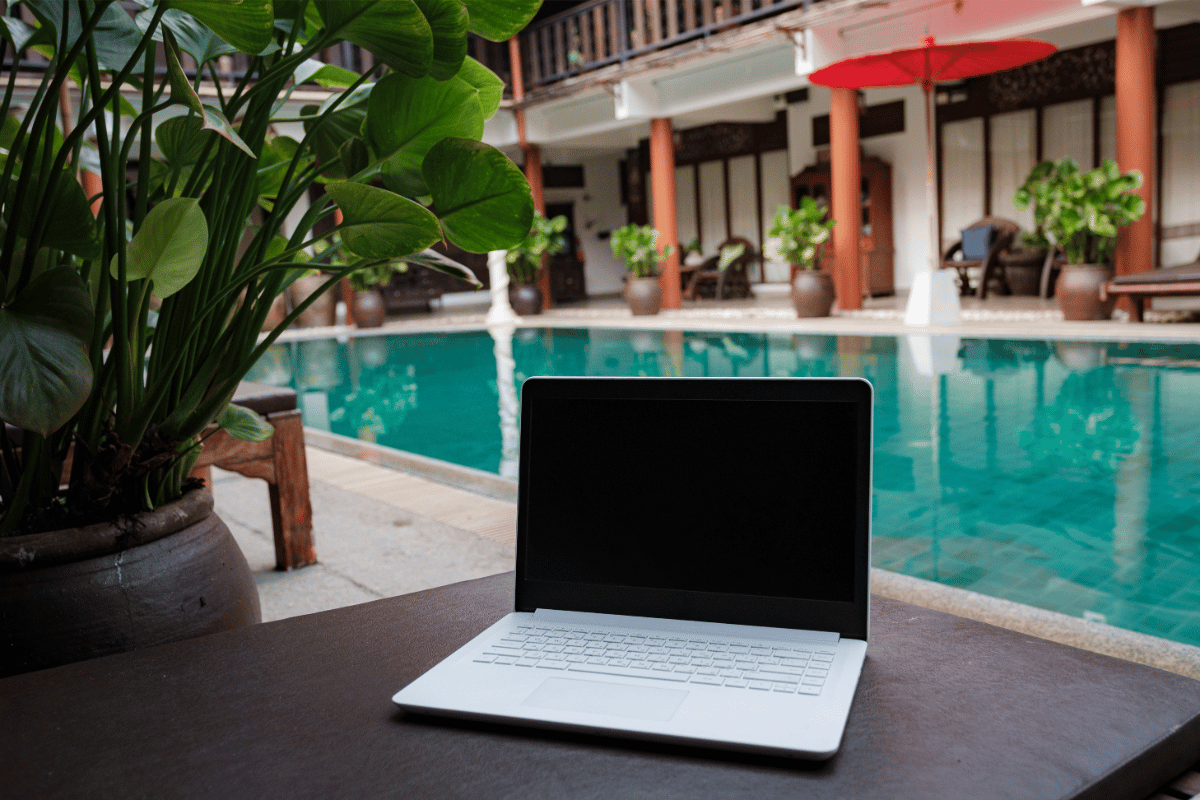Remote Work and Digital Nomad Lifestyle Guide
Welcome to our comprehensive guide on remote work and the digital nomad lifestyle! In today’s fast-paced world, the opportunity to work from anywhere has become a reality for many individuals. Whether you’re a freelancer, an entrepreneur, or an employee of a remote-friendly company, embracing the digital nomad lifestyle offers the freedom to work on your terms and explore new horizons.
Remote work allows you to break free from the traditional office environment and create a life of location independence. You can work from the comfort of your own home, a bustling coffee shop, or even a beachside paradise. The possibilities are endless!
By becoming a digital nomad, you open yourself up to a whole new world of opportunities. From nomadic jobs that cater to a remote work lifestyle to a plethora of resources designed to support your journey, there has never been a better time to embark on this adventure.
Key Takeaways:
- Remote work offers the freedom to work from anywhere in the world.
- The digital nomad lifestyle provides opportunities for exploration and personal growth.
- There are a variety of nomadic jobs available that cater to remote work.
- Numerous resources are available to support your journey as a digital nomad.
- Embracing the digital nomad lifestyle requires adaptability and self-motivation.
Deciphering the Digital Nomad Phenomenon
In this section, we will delve deeper into the digital nomad phenomenon, exploring the emergence of tech-enabled nomadic jobs and the impact of the COVID-19 pandemic on remote work trends. We will also discuss the mindset and expectations that aspiring digital nomads should have in order to thrive in this lifestyle.
The Emergence of Tech-Enabled Nomadic Jobs
Advances in technology have revolutionized the way we work, opening up a world of opportunities for digital nomads. With the rise of remote work, more and more companies are embracing tech-enabled nomadic jobs, allowing individuals to work from anywhere in the world. This has paved the way for a new era of freedom and flexibility, where digital nomads can choose their own path and create a career that aligns with their passions and aspirations.
Impact of the Pandemic on Remote Work Trends
The COVID-19 pandemic has had a profound impact on the way we work, accelerating the transition to remote work. As companies worldwide implemented remote work policies to ensure business continuity during lockdowns, many employees experienced the benefits and newfound freedom of working from home. This unprecedented shift has not only normalized remote work but also highlighted the viability and productivity of distributed teams. As a result, remote work trends have surged, with more individuals opting for location-independent careers and embracing the digital nomad lifestyle.
Mindset and Expectations for Aspiring Digital Nomads
Becoming a digital nomad requires a specific mindset and set of expectations. While the allure of freedom and adventure is enticing, it is crucial to approach this lifestyle with a realistic understanding of the challenges and responsibilities it entails. Aspiring digital nomads should cultivate strong self-discipline, adaptability, and a passion for continuous learning. It is also important to manage expectations and recognize that the digital nomad lifestyle is not without its obstacles. However, with the right mindset and a willingness to embrace the unknown, the digital nomad lifestyle can be an incredibly rewarding and fulfilling experience.
Remote Work and Digital Nomad Lifestyle
Remote work has revolutionized the way we work and opened up a world of possibilities for individuals seeking flexibility and freedom in their careers. The digital nomad lifestyle, enabled by remote work, allows people to work from anywhere in the world, embracing location independence and designing their ideal lifestyle.
One of the key benefits of remote work is the ability to work from any location. Whether it’s a bustling café in Bali, a co-working space in Lisbon, or a cozy hotel room in Tokyo, digital nomads have the freedom to choose their workspace. This flexibility allows individuals to escape the traditional confines of a 9-to-5 job and explore new destinations while earning a living.
The concept of location independence is at the core of the digital nomad lifestyle. It means that digital nomads are not tied down to a specific place and are free to travel and work from wherever they please. This sense of freedom and adventure is what attracts many individuals to pursue a nomadic lifestyle.
Being location independent also means having the opportunity to immerse oneself in new cultures, experience different ways of life, and connect with like-minded individuals from around the world. Digital nomads have the chance to explore diverse environments and adapt to new surroundings, fostering personal growth and creating lasting memories.
Furthermore, remote work offers a range of benefits beyond just the ability to travel. It provides increased flexibility in managing one’s schedule, allowing individuals to prioritize their personal and professional lives according to their own preferences. This flexibility can enhance work-life balance and improve overall well-being.
The digital nomad lifestyle may not be for everyone, as it requires a certain level of self-discipline and adaptability. However, for those who embrace it, remote work and the freedom it brings can lead to a fulfilling and rewarding career and life.
Designing Your Mobile Workspace
When it comes to embracing the nomadic work environment, designing a functional and comfortable mobile workspace is essential. A well-equipped workspace not only enhances productivity but also ensures optimal health and comfort while working remotely. In this section, we will explore the must-have gadgets for the nomadic worker and discuss ergonomic solutions that can enhance your remote work setup.
Essential Gadgets for the Nomadic Worker
To create an efficient and portable office, there are a few essential gadgets that every nomadic worker should consider:
- Laptop or Tablet: Invest in a lightweight and powerful laptop or tablet that suits your work requirements. Look for features like long battery life and a comfortable keyboard.
- Portable Charger: Ensure that you never run out of battery power by carrying a portable charger. Opt for one with multiple USB ports to charge multiple devices simultaneously.
- Noise-Canceling Headphones: Block out distractions and create a focused work environment with noise-canceling headphones. These can enhance productivity, especially in noisy cafes or co-working spaces.
- Wireless Keyboard and Mouse: If you prefer working on a bigger screen or need more comfortable typing and navigation, consider investing in a wireless keyboard and mouse.
Ergonomic Solutions for Health and Comfort
Working remotely for extended periods can take a toll on your physical health. Here are some ergonomic solutions that can help you maintain good health and comfort while on the go:
- Adjustable Laptop Stand: Use an adjustable laptop stand to raise the screen to eye level, promoting good posture and reducing strain on your neck and shoulders.
- Ergonomic Keyboard and Mouse: Consider using an ergonomic keyboard and mouse to minimize the risk of developing wrist and hand injuries, such as carpal tunnel syndrome.
- Portable Lumbar Support: Support your lower back with a portable lumbar roll or cushion. This can help alleviate back pain and promote a healthier sitting posture.
- Standing Desk Converter: If you prefer working while standing, invest in a portable standing desk converter that can be easily set up on any flat surface.
By investing in these gadgets and ergonomic solutions, you can create a mobile workspace that promotes productivity, supports your health, and enhances your overall remote work experience.
| Gadget | Description |
|---|---|
| Laptop or Tablet | An essential device for nomadic workers, offering flexibility and portability for remote work tasks. |
| Portable Charger | A power source on the go, ensuring your devices stay charged even when you are away from traditional power outlets. |
| Noise-Canceling Headphones | Block out external noise, creating a quiet and focused work environment wherever you are. |
| Wireless Keyboard and Mouse | Enhance comfort and convenience by using a wireless keyboard and mouse that can improve your typing and navigation experience. |
| Adjustable Laptop Stand | Keep your screen at eye level and maintain good posture by using an adjustable laptop stand. |
| Ergonomic Keyboard and Mouse | Reduce the risk of wrist and hand injuries by using an ergonomic keyboard and mouse that are designed for comfort and proper alignment. |
| Portable Lumbar Support | Support your lower back and maintain a healthier sitting posture with a portable lumbar roll or cushion. |
| Standing Desk Converter | Transform any flat surface into a standing desk, allowing you to switch between sitting and standing positions while working. |
Crafting a Routine for Location Independence
Establishing a routine is crucial for digital nomads who embrace the location-independent lifestyle. While the allure of traveling and exploring new places can be exciting, it’s essential to maintain a sense of structure and discipline in order to thrive in this unique work environment.
Time Management Across Continents
Managing time effectively across different time zones is one of the key challenges for digital nomads. To stay productive and meet deadlines, it’s important to create a schedule that accounts for the time differences between your current location and your clients or team members. Utilize time tracking tools and set clear boundaries to ensure efficient communication and collaboration across continents.
When planning your days, consider the peak productivity hours for both yourself and your clients or team members. This will allow you to prioritize tasks and allocate your time accordingly. Remember to factor in time for rest, relaxation, and exploring your surroundings to maintain a healthy work-life balance.
Work-Life Balance When Home is Everywhere
One of the advantages of the digital nomad lifestyle is the ability to work from anywhere, essentially making the world your home. However, it’s important to establish boundaries between work and personal life to maintain a healthy work-life balance.
Designate specific work hours and create a dedicated workspace wherever you are, whether it’s a co-working space, a coffee shop, or a comfortable corner in your accommodations. This will help you separate work time from personal time and get into a focused mindset when needed.
Additionally, prioritize self-care and incorporate activities that bring you joy and relaxation into your routine. Whether it’s exploring the local culture, engaging in physical exercise, or practicing mindfulness, taking time for yourself will enhance your overall well-being and contribute to a successful digital nomad journey.
Toolbox for Remote Collaboration
Software Essentials for Virtual Teams
Remote collaboration requires the right tools and software to facilitate effective communication and project management. Virtual teams rely on advanced platforms that foster seamless collaboration, regardless of geographical constraints. Here are some software essentials that every virtual team should consider:
- Slack: A popular team messaging application that enables real-time communication, file sharing, and group conversations. Slack provides channels for different projects or departments, allowing team members to stay organized and connected.
- Zoom: A reliable video conferencing tool that facilitates virtual meetings, conference calls, and screen sharing. Zoom’s user-friendly interface and high-quality video and audio make it an ideal choice for remote teams.
- Trello: A versatile project management tool that allows teams to create boards, lists, and cards to track tasks, assign responsibilities, and monitor progress. Trello provides a visual and intuitive interface for seamless project collaboration.
- Google Workspace: Formerly known as G Suite, Google Workspace offers a suite of cloud-based productivity tools, including Gmail, Google Drive, Google Docs, and Google Sheets. These tools enable real-time collaboration and document sharing, enhancing team efficiency.
These software solutions empower virtual teams to collaborate effectively, streamline workflows, and ensure seamless communication and project coordination. By leveraging these tools, remote teams can overcome geographical barriers and work together efficiently.
Best Practices for Remote Team Communication
- Establish Communication Guidelines: Create clear and concise communication guidelines for your remote team. Decide on appropriate communication channels for different types of messages, establish response time expectations, and encourage transparent and open communication.
- Regular Video Meetings: Schedule regular video meetings to foster team cohesion and maintain face-to-face interactions. Video meetings help team members connect on a personal level and build rapport, strengthening overall collaboration.
- Use Written Communication Effectively: Utilize written communication tools like email and instant messaging for important announcements, project updates, and documentation. Clearly convey expectations, deadlines, and action items to ensure everyone is on the same page.
- Active Listening: Practice active listening during virtual meetings and discussions. Pay attention to your colleagues’ perspectives, ask clarifying questions, and provide constructive feedback. Active listening promotes understanding and builds stronger relationships.
- Cultural Sensitivity: Remote teams often consist of individuals from diverse backgrounds. Be mindful of cultural differences in communication styles, tone, and work preferences. Foster inclusivity and respect for varying perspectives and approaches.
By following these best practices, remote teams can enhance their communication skills, foster collaboration, and create a cohesive and productive virtual work environment.
Mitigating Risk: Digital Security While on the Move
When working as a digital nomad, it is essential to prioritize digital security to protect sensitive work data while on the move. Cybersecurity threats can pose significant risks to remote workers, making it crucial to employ strategies and tools that ensure secure remote work.
One of the key measures digital nomads can take is to use virtual private networks (VPNs). A VPN encrypts internet traffic, making it difficult for hackers or malicious actors to intercept and access sensitive information. By routing internet traffic through a secure server, VPNs provide an added layer of protection, especially when using public Wi-Fi networks.
Securing Wi-Fi connections is another important aspect of digital security. It is advisable to avoid using unsecured public Wi-Fi networks, as these can be vulnerable to hacking attempts. Instead, consider using personal hotspots or trusted networks with appropriate security measures.
“Digital security is not optional for digital nomads; it is an absolute necessity. Protecting your data and ensuring secure remote work should be a top priority.”
Implementing strong and unique passwords for all accounts, employing two-factor authentication, and regularly updating software and devices are additional crucial steps to enhance digital security. It is also advisable to back up important data regularly and use encryption tools for sensitive files.
Constant awareness and education about current cybersecurity threats and best practices are essential for digital nomads. Stay informed about the latest security measures and potential risks to adapt and enhance your digital security strategy accordingly.
By taking proactive steps to prioritize digital security, digital nomads can mitigate risks and ensure secure remote work, allowing them to focus on their work and enjoy the freedom and flexibility of their nomadic lifestyle.
Tapping into Global Digital Nomad Communities
In the digital nomad lifestyle, building connections and networking remotely is essential for personal and professional growth. By tapping into global digital nomad communities, you can enhance your remote work experience and unlock a myriad of opportunities. These communities serve as valuable platforms for knowledge sharing, collaboration, and support, enabling you to connect with like-minded individuals around the world.
Building Your Network Remotely
Building a network of fellow digital nomads can provide you with valuable insights, advice, and potential collaborations. Here are some tips for building your network remotely:
- Join online forums and discussion groups dedicated to digital nomads. These platforms, such as Reddit’s r/digitalnomad, Facebook groups, and niche forums, allow you to connect and exchange ideas with nomads from various backgrounds and experiences.
- Attend virtual conferences, webinars, and meetups designed for digital nomads. These events provide an excellent opportunity to network with professionals in your industry and establish meaningful connections.
- Utilize social media platforms to connect with digital nomads. LinkedIn, Twitter, and Instagram are popular platforms where you can find and engage with fellow nomads, share insights, and expand your professional network.
- Participate in coworking spaces and coliving communities. These physical spaces provide opportunities to meet and collaborate with other digital nomads in person, fostering relationships beyond virtual connections.
Navigating Cultural Integration
As a digital nomad, cultural integration plays a crucial role in successfully adapting to different work environments and customs. Here are some tips for navigating cultural integration:
- Research and understand the local culture and customs of the places you visit. Familiarize yourself with etiquette, greetings, and common social norms to show respect and avoid misunderstandings.
- Be open-minded and embrace new experiences. Engage with locals and immerse yourself in the local culture to gain a deeper understanding of the community you’re living in.
- Develop cross-cultural communication skills. Learn a few key phrases in the local language to facilitate interactions and build rapport with locals.
- Respect and adapt to different work styles. Understand that work cultures can vary significantly from country to country, and being flexible and adaptable will help you navigate the differences.
Tapping into global digital nomad communities and navigating cultural integration are essential components of a fulfilling digital nomad lifestyle. By building a strong network and adapting to new cultures, you’ll not only enhance your professional opportunities but also foster personal growth and create lifelong connections.
Strategies for Effective Remote Career Development
Remote work offers exciting opportunities for career growth and advancement. Whether you are a digital nomad or an individual seeking location independence, developing a successful remote career requires strategic planning and continuous learning. Here are some crucial strategies to help you achieve your professional goals in the remote work landscape.
Finding Remote Job Opportunities
One of the key aspects of remote career development is finding suitable job opportunities that align with your skills and interests. Consider the following strategies:
- Explore remote job boards and websites specialized in remote work opportunities.
- Optimize your online presence by updating your LinkedIn profile and showcasing your remote work skills.
- Network with professionals in your industry who have experience with remote work.
- Attend virtual conferences and webinars to connect with remote-friendly companies.
- Utilize social media platforms to search for remote job openings and engage with remote work communities.
Continuous Learning and Skill Development
In the rapidly evolving digital landscape, staying ahead of the curve is essential for long-term remote career growth. Here are some strategies to expand your skillset:
- Enroll in online courses and certifications relevant to your field of expertise.
- Join industry-specific groups and forums to stay updated on the latest trends and developments.
- Participate in webinars and virtual workshops to enhance your knowledge and skills.
- Embrace self-learning through books, podcasts, and online resources.
- Seek mentorship from experienced remote professionals for guidance and advice.
Building a Successful Remote Career
To build a thriving remote career, it’s important to focus on professional growth and demonstrate your value as a remote worker. Consider the following strategies:
- Set clear and realistic goals for your remote career and create an action plan to achieve them.
- Maintain a strong work ethic and consistently deliver high-quality results.
- Communicate effectively with your remote team and demonstrate strong virtual collaboration skills.
- Proactively seek feedback from your peers and supervisors to continually improve your performance.
- Showcase your remote work experience and achievements in your resume and portfolio.
By implementing these strategies, you can navigate the remote work landscape and maximize your career growth potential. Remember, remote career development is an ongoing journey, and with dedication and adaptability, you can achieve success and fulfillment in your remote professional endeavors.
The Psychology of Remote Work: Maintaining Motivation
The Challenge of Isolation
The remote work lifestyle can be incredibly liberating, offering freedom and flexibility to individuals around the world. However, it also presents unique challenges, such as the potential for isolation. Working from home or in different locations without regular face-to-face interactions can lead to feelings of loneliness and disconnection.
Isolation can negatively impact motivation and overall well-being. Without the support and social interactions found in traditional office environments, remote workers must find alternative ways to combat feelings of isolation and stay motivated.
To overcome the challenge of isolation, remote workers can:
- Connect with like-minded individuals: Seek out digital nomad communities, online forums, and social media groups to connect with others who understand the remote work lifestyle.
- Engage in virtual co-working: Participate in virtual co-working sessions where individuals work alongside others remotely, providing the sense of working in a shared space.
- Prioritize social connections: Actively reach out to friends, family, and colleagues through video calls, instant messaging, or even offline meetups when possible.
By recognizing the challenge of isolation and taking intentional steps to combat it, remote workers can maintain their motivation and create a sense of connection with others.
Staying Connected: Beyond Work Relationships
While work-related connections are important, it’s equally vital for remote workers to foster social connections beyond their professional lives. Maintaining a healthy work-life balance and nurturing personal relationships can greatly enhance overall well-being and motivation.
Remote workers can stay connected by:
- Participating in local activities and events: Engage in local community activities or join clubs and groups to meet new people and establish a network outside of work.
- Exploring hobbies and interests: Pursue personal passions and hobbies to not only meet new people but also to find fulfillment and joy outside of work.
- Scheduling time for social interactions: Set aside dedicated time each week for socializing with friends, family, or other remote workers to foster meaningful relationships.
By nurturing social connections outside of work, remote workers can cultivate a sense of belonging and fulfillment, which in turn contributes to their motivation and overall well-being.
Planning for Financial Sustainability
One of the key aspects of the digital nomad lifestyle is ensuring financial sustainability while working remotely. As you embark on your nomadic journey, it is essential to have a solid financial plan in place to manage your expenses, save money, and comply with tax regulations.
Budgeting for a Nomadic Lifestyle
Creating a budget tailored to your nomadic lifestyle is crucial for maintaining financial stability. Consider the following tips when budgeting:
- Track your expenses: Keep a record of all your financial transactions to gain insights into your spending habits and identify areas where you can cut back.
- Establish a contingency fund: Set aside a portion of your income as an emergency fund to cover unexpected expenses or periods of reduced income.
- Research cost of living: Research the cost of living in your chosen destinations to estimate your monthly expenses accurately. Factor in accommodation, transportation, food, healthcare, and other essentials.
- Avoid unnecessary expenses: Prioritize your needs over wants and resist the urge to splurge on non-essential items. Be mindful of your spending habits to ensure your budget remains sustainable.
Understanding Taxes and International Income
As a remote worker, understanding your tax obligations and managing international income is essential for maintaining financial compliance. Consider the following points:
- Research tax requirements: Familiarize yourself with the tax laws and regulations in your home country and the countries you plan to visit or reside in. Consult with a tax professional to ensure you remain compliant.
- Keep accurate records: Maintain detailed records of your income, expenses, and tax-related documents to facilitate the tax filing process.
- Investigate tax treaties: Research tax treaties between your home country and the countries you plan to work in. These treaties can help you understand the tax implications of earning income abroad.
- Consider tax planning strategies: Work with a tax professional to explore efficient tax planning strategies that can maximize your tax savings and minimize your liabilities.
By budgeting effectively and understanding tax obligations, you can achieve financial sustainability as a digital nomad. Plan ahead, educate yourself on financial matters, and seek guidance when necessary to ensure your financial well-being throughout your nomadic journey.
Identifying Ideal Destinations for Digital Nomads
When it comes to embracing the digital nomad lifestyle, finding the right destination can make all the difference. To help you navigate through the vast options available, we have rounded up the best places to live as a digital nomad. These remote work-friendly locations provide an optimal environment for digital nomads, offering reliable internet connectivity, vibrant digital nomad communities, and a favorable cost of living.
“The world is your oyster when it comes to choosing a digital nomad destination. From bustling cities to exotic beach towns, there is a place that suits every nomad’s preferences and lifestyle.”
So, where are these ideal digital nomad destinations? Here are some recommendations to consider:
| Destination | Internet Connectivity | Digital Nomad Community | Cost of Living |
|---|---|---|---|
| Bali, Indonesia | Excellent | Thriving | Affordable |
| Chiang Mai, Thailand | Good | Active | Low |
| Medellín, Colombia | Reliable | Growing | Reasonable |
| Lisbon, Portugal | Fast | Vibrant | Moderate |
| Tulum, Mexico | Stable | Hip | Mid-range |
These destinations offer a combination of essential factors that make them attractive for digital nomads. Whether you prioritize a reliable internet connection, a supportive community, or a reasonable cost of living, there is a destination that meets your requirements.
Remember to consider your own preferences, such as climate, culture, and lifestyle, when choosing a digital nomad destination. Each location has its unique appeal, and finding the perfect match will contribute to a fulfilling digital nomad lifestyle.
The Art of Minimalist Travel
Packing Tips for the Long-term Traveler
When it comes to long-term travel, packing efficiently is crucial. As a digital nomad, you want to strike the perfect balance between having everything you need and keeping your luggage lightweight and mobile. Here are some minimalist travel tips to help you pack smart:
- Make a packing list: Before you start packing, create a list of essentials. This will help you prioritize and avoid overpacking.
- Choose versatile clothing: Opt for clothing items that can be mixed and matched to create different outfits. Stick to a color scheme to ensure everything goes well together.
- Roll your clothes: Rolling your clothes instead of folding them not only saves space but also helps prevent wrinkles.
- Pack travel-sized toiletries: Minimize the amount of toiletries you bring by opting for travel-sized containers or solid toiletries.
- Invest in packing cubes: Packing cubes help keep your belongings organized and make it easier to find what you need without unpacking everything.
- Leave room for souvenirs: If you know you’ll be picking up souvenirs along the way, leave some extra space in your luggage to accommodate them.
Decluttering Your Life for Mobility
Living a mobile lifestyle as a digital nomad requires decluttering and embracing minimalism. Here’s why decluttering is essential:
- Facilitates mobility: Having fewer possessions makes it easier to move around and switch locations without being burdened by excess baggage.
- Reduces costs: Decluttering allows you to minimize storage expenses and potentially sell unnecessary items to save money.
- Creates mental clarity: A clutter-free environment promotes focus and productivity, enabling you to better adapt to new surroundings and workflows.
- Enhances freedom: By letting go of material possessions, you gain the freedom to explore new opportunities and experiences without being tied down.
Start by assessing your belongings and categorizing them into essentials, sentimental items, and things you can live without. Consider donating, selling, or giving away the items you no longer need. Embrace a minimalist mindset and prioritize experiences over material possessions to fully embrace the nomadic lifestyle.
Maintaining Physical and Mental Wellness Abroad
Maintaining physical and mental wellness is crucial for digital nomads living abroad. The nomadic lifestyle can be exciting and invigorating, but it also comes with its own set of challenges. To ensure your well-being while on the go, it’s important to prioritize self-care, incorporate exercise routines into your nomadic lifestyle, and maintain a healthy diet.
Exercise Routines for the Nomadic Lifestyle
Staying active while traveling is essential for both your physical and mental well-being. Here are some exercise routines that can be easily incorporated into your nomadic lifestyle:
- Outdoor Activities: Take advantage of the opportunities to explore your new surroundings. Engage in activities like hiking, swimming, or cycling to stay active and connect with nature.
- Bodyweight Workouts: No gym? No problem. Bodyweight exercises, such as push-ups, squats, and planks, require minimal equipment and can be done anywhere, anytime.
- Yoga and Pilates: These low-impact workouts provide physical and mental strength, flexibility, and relaxation. Find online classes or download apps to guide your practice.
- Interval Training: High-intensity interval training (HIIT) workouts are time-efficient and require minimal space. Alternate between short bursts of intense exercise and brief periods of rest for an effective workout.
Remember to listen to your body and choose activities that you enjoy. Consider incorporating exercise into your daily routine, whether it’s in the morning to energize your day or in the evening to wind down.
Nutrition and Diet on the Go
Eating healthily while traveling can be a challenge, but it’s crucial for maintaining your energy levels and overall well-being. Here are some tips for maintaining a healthy diet as a digital nomad:
- Plan Ahead: Research local grocery stores and markets to stock up on fresh fruits, vegetables, and other nutritious foods. This will help you make healthier food choices and save money.
- Cook Your Own Meals: If you have access to a kitchen, take advantage of it. Cooking your own meals allows you to have control over the ingredients and portion sizes.
- Stay Hydrated: Carry a reusable water bottle with you at all times and make sure to drink plenty of water throughout the day. Dehydration can affect your energy levels and overall well-being.
- Choose Local Specialties: Embrace the local cuisine and opt for traditional dishes that are typically made with fresh, local ingredients.
- Indulge in Moderation: While it’s important to eat healthily, it’s also okay to indulge in local treats and delicacies in moderation. Balance is key.
By making conscious food choices and prioritizing nutrition, you can support your physical and mental well-being while living the nomadic lifestyle.
Professional Skills in Demand for Remote Jobs
When it comes to remote work, employers are looking for candidates with specific skills and qualifications. These skills not only enable individuals to excel in remote roles but also contribute to the success of remote teams and organizations. If you’re considering a remote career or want to enhance your remote work qualifications, here are some in-demand skills that can help you thrive in the remote work landscape:
- Communication Skills: Effective communication is crucial in remote work settings where face-to-face interactions are limited. Remote workers must be able to express themselves clearly, actively listen to others, and adapt their communication style to different mediums, such as email, video calls, and chat platforms. Strong communication skills foster collaboration, build trust, and ensure efficient remote team coordination.
- Adaptability: Remote work often requires individuals to navigate various challenges and changes. Being adaptable means being able to quickly adjust to new environments, technologies, and workflows. By embracing change and being open to innovation, remote workers can thrive in dynamic work settings and demonstrate their ability to overcome obstacles and deliver results.
- Self-Motivation: Remote work offers flexibility and autonomy, but it also requires self-discipline. Remote workers should possess self-motivation to stay productive and meet deadlines without constant supervision. Demonstrating a strong work ethic, setting goals, managing time effectively, and staying focused on tasks are essential qualities that remote employers appreciate.
- Problem-Solving: Remote work often presents unique challenges that require creative problem-solving. Remote workers should be resourceful, proactive, and capable of finding solutions independently. Being able to analyze situations, think critically, and make informed decisions are key problem-solving skills that contribute to the efficiency and success of remote work.
- Organizational Skills: Remote workers must be highly organized to manage their time, tasks, and priorities effectively. An organized remote worker can create schedules, set realistic goals, and stay on top of deadlines. By demonstrating strong organizational skills, remote workers can ensure they meet expectations, deliver high-quality work, and maintain a healthy work-life balance.
These are just a few examples of the professional skills that are in demand for remote jobs. Keep in mind that the specific skills required may vary depending on the industry and role. Continuously updating and developing these skills will not only increase your chances of securing remote work opportunities but also enable you to thrive in the remote work landscape.
“Developing and refining these skills will not only make you a valuable asset to remote employers but also enhance your overall professional growth.” – Jane Smith, Remote Work Expert
Conclusion
Aspiring digital nomads have much to gain from embracing the remote work and digital nomad lifestyle. Throughout this guide, we have explored the various facets of remote work and provided insights and strategies for success. Here are the key takeaways for those who aspire to live and work as digital nomads:
1. Embrace Location Independence
Remote work offers the freedom and flexibility to work from anywhere in the world. Take advantage of this opportunity to design a lifestyle that suits your preferences, whether it’s exploring new cultures, living in nature, or experiencing vibrant city life.
2. Develop a Routine and Prioritize Time Management
Establishing a routine is essential for maintaining productivity and work-life balance as a digital nomad. Effective time management across different time zones and the ability to create structure in your day will help you thrive in this lifestyle.
3. Build a Strong Network and Tap into Digital Nomad Communities
Connecting with fellow digital nomads and building a network remotely is crucial for support, collaboration, and expanding opportunities. Tap into global digital nomad communities to find inspiration, share experiences, and learn from others on the same journey.
Looking to the Future
The future of remote work is bright, with increasing opportunities and evolving trends. As technology continues to advance, more industries are embracing remote work, creating a demand for digital nomads. Stay adaptable, continuously update your skills, and be prepared to ride the wave of the remote work revolution.
So, whether you dream of working from a tropical island, exploring new cities, or simply having the freedom to choose where you want to live and work, the world of remote work and digital nomad lifestyle awaits you. Take these key takeaways to heart, and embark on your own exciting journey as a digital nomad.








